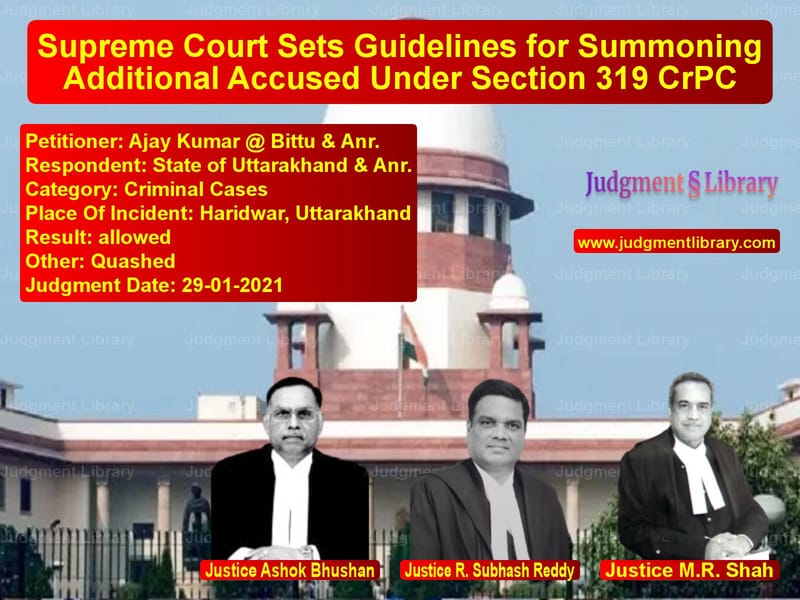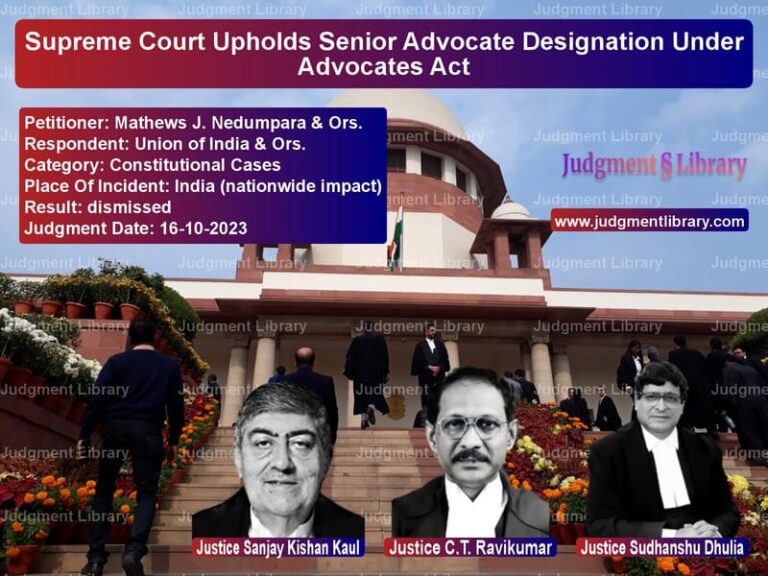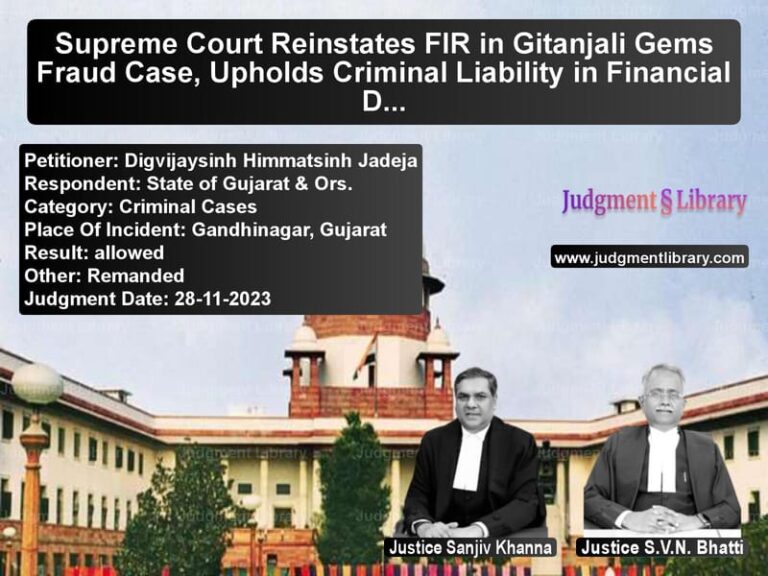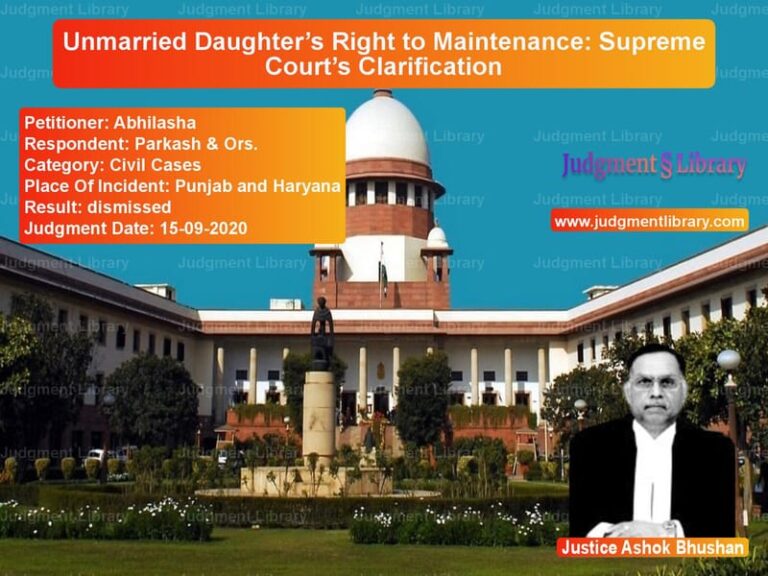Supreme Court Sets Guidelines for Summoning Additional Accused Under Section 319 CrPC
The Supreme Court of India, in the case of Ajay Kumar @ Bittu & Anr. vs. State of Uttarakhand & Anr., addressed the issue of summoning additional accused under Section 319 of the Criminal Procedure Code (CrPC). The judgment clarified the legal threshold for invoking Section 319 CrPC and emphasized that summoning additional accused should be based on strong and cogent evidence.
Background of the Case
The case arose from an incident in Haridwar, Uttarakhand, where an FIR was lodged against the appellants under various sections of the IPC, including Sections 147, 148, 149, 323, 324, 307, 452, 504, and 506. The investigating officer, after conducting an inquiry, excluded the names of the appellants from the chargesheet.
During the trial, the prosecution examined key witnesses, including the complainant (PW-1) and another witness (PW-2), who implicated the appellants. Based on their testimony, the complainant filed an application under Section 319 CrPC, seeking to summon the appellants as additional accused.
Read also: https://judgmentlibrary.com/review-of-criminal-case-transfer-supreme-court-reinstates-delhi-trial/
The Sessions Court initially rejected the application, citing a lack of specific roles assigned to the appellants in the witness statements. However, upon a revision petition filed by the complainant, the Uttarakhand High Court directed the Sessions Court to reconsider the application. Subsequently, the Sessions Court summoned the appellants as accused.
Challenging this decision, the appellants approached the Supreme Court.
Key Legal Issues Addressed
1. Scope and Application of Section 319 CrPC
The appellants contended that Section 319 CrPC, which allows the court to summon additional accused, should be exercised sparingly. They argued that the witness statements did not provide sufficient grounds for their summoning.
2. Whether the High Court’s Direction to Reconsider Was Justified
The appellants argued that the High Court had erred in directing the reconsideration of the application without assessing whether the evidence met the necessary threshold.
3. Whether Non-Appearance of the Appellants Justified Non-Bailable Warrants
Following the summoning order, the appellants failed to appear in court, leading to the issuance of non-bailable warrants (NBWs). The Supreme Court had to determine whether the NBWs were justified.
Arguments by the Petitioner (Ajay Kumar @ Bittu & Anr.)
- The power under Section 319 CrPC should be exercised only when there is strong and cogent evidence against the accused.
- The statements of PW-1 and PW-2 were insufficient, as they did not attribute specific roles to the appellants.
- The appellants were wrongly summoned despite being excluded from the chargesheet by the investigating officer.
- The High Court’s direction to reconsider the application was based on a misinterpretation of the legal threshold required under Section 319 CrPC.
Arguments by the Respondent (State of Uttarakhand & Complainant)
- The witness testimonies clearly implicated the appellants, and the trial court was justified in summoning them.
- Section 319 CrPC empowers the court to summon additional accused based on evidence recorded during trial.
- The appellants’ failure to appear justified the issuance of non-bailable warrants.
- The High Court correctly directed the Sessions Court to reconsider the application in light of the Supreme Court’s ruling in Rajesh & Ors. vs. State of Haryana (2019) 6 SCC 368.
Supreme Court’s Analysis and Findings
1. Legal Threshold for Section 319 CrPC
The Supreme Court reaffirmed that the power under Section 319 CrPC is discretionary and should be exercised only in cases where there is compelling evidence. The judgment stated:
“Power under Section 319 CrPC is a discretionary and extraordinary power. It is to be exercised sparingly and only in cases where strong and cogent evidence occurs against a person from the evidence led before the Court.”
Read also: https://judgmentlibrary.com/ndps-act-and-bail-supreme-court-grants-relief-in-karnataka-drug-case/
2. Application of the Test Laid Down in Hardeep Singh vs. State of Punjab
The Court referred to the Constitution Bench judgment in Hardeep Singh vs. State of Punjab & Ors. (2014) 3 SCC 92, which established that:
- The test to be applied for summoning additional accused is higher than the prima facie case standard used for framing charges.
- The evidence must be strong enough to indicate that, if uncontroverted, it could lead to conviction.
3. Reversal of High Court’s Order
The Supreme Court found that the High Court had incorrectly directed reconsideration of the application under Section 319 CrPC without properly assessing the legal requirements. It ruled:
“The High Court erred in directing reconsideration without first determining whether the evidence on record met the standard required for invoking Section 319 CrPC.”
4. Non-Bailable Warrants Were Unwarranted
The Supreme Court observed that since the summoning order itself was legally flawed, the issuance of non-bailable warrants was also unjustified. It directed the recall of NBWs issued against the appellants.
Supreme Court’s Verdict
- The High Court’s order directing reconsideration of the Section 319 CrPC application was set aside.
- The trial court’s order summoning the appellants was quashed.
- The non-bailable warrants issued against the appellants were revoked.
- The appellants were relieved from further prosecution in this matter.
Conclusion
This judgment provides clarity on the invocation of Section 319 CrPC and reinforces that:
- Summoning additional accused requires evidence stronger than a prima facie case.
- Courts must exercise caution while invoking discretionary powers under Section 319 CrPC.
- High Courts must ensure that lower courts adhere to the principles laid down by the Supreme Court in such cases.
- Non-bailable warrants should not be issued mechanically when the legal basis for summoning is questionable.
By quashing the summoning order, the Supreme Court has reiterated the importance of judicial restraint and procedural fairness in criminal trials.
Petitioner Name: Ajay Kumar @ Bittu & Anr..Respondent Name: State of Uttarakhand & Anr..Judgment By: Justice Ashok Bhushan, Justice R. Subhash Reddy, Justice M.R. Shah.Place Of Incident: Haridwar, Uttarakhand.Judgment Date: 29-01-2021.
Don’t miss out on the full details! Download the complete judgment in PDF format below and gain valuable insights instantly!
Download Judgment: ajay-kumar-@-bittu-&-vs-state-of-uttarakhand-supreme-court-of-india-judgment-dated-29-01-2021.pdf
Directly Download Judgment: Directly download this Judgment
See all petitions in Bail and Anticipatory Bail
See all petitions in Attempt to Murder Cases
See all petitions in Fraud and Forgery
See all petitions in Judgment by Ashok Bhushan
See all petitions in Judgment by R. Subhash Reddy
See all petitions in Judgment by Mukeshkumar Rasikbhai Shah
See all petitions in allowed
See all petitions in Quashed
See all petitions in supreme court of India judgments January 2021
See all petitions in 2021 judgments
See all posts in Criminal Cases Category
See all allowed petitions in Criminal Cases Category
See all Dismissed petitions in Criminal Cases Category
See all partially allowed petitions in Criminal Cases Category







